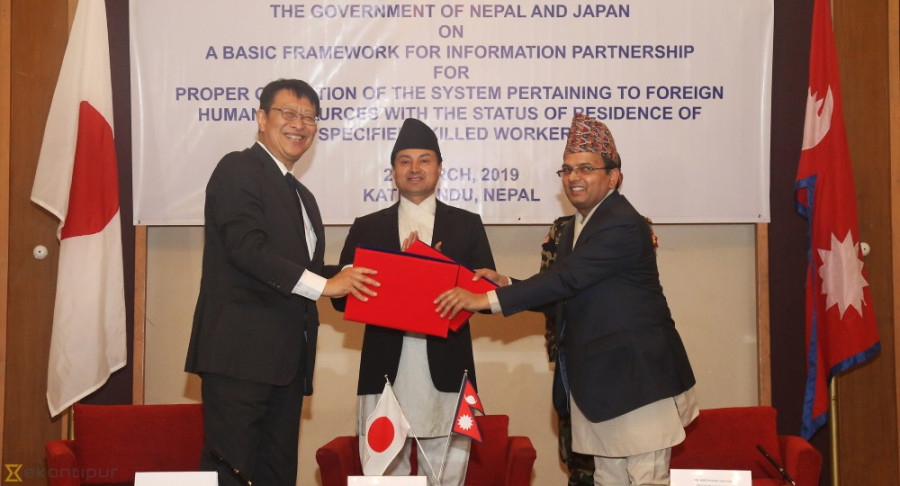National
After labour deal, Japanese employers are coming forward to hire Nepali workers
Nearly two months after Nepal and Japan signed a labour agreement in Kathmandu, Japanese employers have started showing interest in hiring Nepali workers.
Chandan Kumar Mandal
Nearly two months after Nepal and Japan signed a labour agreement in Kathmandu, Japanese employers have started showing interest in hiring Nepali workers.
Although formal negotiations between officials from both the countries have not made significant progress since the signing of the agreement in last March, allowing entry of Nepali workers to the Asian giant nation, “Japanese employers have come forward to provide jobs to Nepali workers”, according to officials.
A high-level source at the Ministry of Labour, Employment and Social Security, a handful of companies have directly reached out to the government, expressing their interest to hire Nepali workers once the migration of Nepali workers begins.
“A few companies have approached us and told us that they would like to hire workers from Nepal,” said a ministry official on condition of anonymity because he was not authorised to speak about the ongoing negotiations regarding the labour deal, as it also involves diplomatic relations between two countries. “This is a good beginning,” he said.
Japan has enlisted a total of 14 sectors for which it plans to hire an estimated 345,150 foreign workers from nine countries including Nepal, which is the only South Asian nation on the list.
After signing the labour deal termed “Memorandum of Cooperation (MoC) on sending Nepali workers with the status of residence of Specified Skilled Workers (SSW) to Japan” both countries need to finalise mechanisms before Nepali workers start taking up jobs in Japan which would hire workers under the ‘government to government’ modality.
“The interested employers have also offered to make arrangements to train Nepali workers so that they can easily adapt to the working conditions in Japan,” he added. “Representatives of these companies have said they can train Nepali workers for free as there is not much difference between the working style and equipment used in the two countries—at least in some sectors like agriculture and cleaning,” added the official.
Interest to hire Nepali workers has come from companies mainly working in agriculture and cleaning sectors—which have been also on the priority list of the Nepal side for sending its workers—including hospitality and general mechanics.
Aspiring candidates need to clear language and skill test to be qualified to work in Japan, one of the most lucrative labour destinations for Nepali workers whose concentration currently is high in Gulf Countries and Malaysia.
During a recent meeting with officials of the Embassy of Japan in Kathmandu, the Nepali side had requested to send the working procedures for conducting Japanese language test.
The aspirant candidates will be expected to have a Japanese language level equivalent to “N4” on the Japanese Language Proficiency Test (JLPT) which has altogether five levels.
“We want to go ahead with the implementation of the deal at the earliest so we have requested them to share the details on how language test will be conducted,” added the official. “Both sides also exchanged questions with each other.”
Besides clearing language test, Nepali workers will also have to pass the skill test proving their competence for the sector they have applied to work for.
Finalising skill test mechanism has remained yet another issue that the Japanese side needs to get done before accepting foreign workers, which was made possible through a revision into the Immigration Control Act.
“We have pledged them that we can provide them with institutional and other support for skill test. For example, Nepal Academy of Tourism and Hotel Management can conduct such test for the hospitality sector in the presence of Japanese representatives,” the labour ministry official added.
The Nepali side has also allocated the space it would require to set up a separate unit under the Department of Foreign Employment to facilitate the process of recruiting Nepali workers and conducting language and skill tests, as agreed in the understanding.
Nepal and Japan are yet to fix the quota—the maximum number of workers Japan would be taking in a year.
“We requested them to give us a tentative number of workers they wish to hire from Nepal. Without knowing the quota, there could be a risk of having a large number of applicants but only a few landing the job,” said the ministry official. “During discussions, the Japanese side has said Nepali workers will be on the priority list.”




 9.7°C Kathmandu
9.7°C Kathmandu














